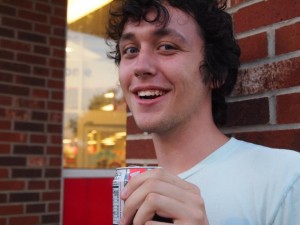


 Tonight’s interviewee is Josh Chamberlain. I first met Josh when he was about eleven years old. If I’m not mistaken, it was at his sister Amelia’s first birthday party, probably right around the time that the black and white photo of them to the right was taken. Josh turned out to be a pretty incredible young man, and I’m proud to be able to call him my friend. Here’s our interview.
Tonight’s interviewee is Josh Chamberlain. I first met Josh when he was about eleven years old. If I’m not mistaken, it was at his sister Amelia’s first birthday party, probably right around the time that the black and white photo of them to the right was taken. Josh turned out to be a pretty incredible young man, and I’m proud to be able to call him my friend. Here’s our interview.
MARK: You recently left Ypsilanti to attend college in Cincinnati, right?
JOSH: Yes. I’m at the University of Cincinnati, studying in the college of Design, Architecture, Art, and Planning (DAAP).
MARK: Why’d you decide to go there?
JOSH: I had heard from a variety of sources that it’s currently the best school for design in the country. I toured it, and it looked amazing, so I applied. I also found out that the program requires a mandatory co-op, where all students take time off from school and work in their chosen field, often on the other side of the world. It’a a pretty unique program, and it played a big part in my decision.
MARK: When I asked if you wanted to do an exit interview, you said that you’d do it, but added, “I didn’t leave because I don’t like Ypsi.” Is your impression that most of the people who do these interviews left Ypsi because they hated the town?
JOSH: I don’t think most people leave because they have negative feelings towards Ypsi, but because they couldn’t find what they were looking for there. I still miss Ypsi, and consider it my home. I just left because I wanted to go to school in Cincinnati.
MARK: I watched a video the other day, of binge-drinking undergrads at U-M on a football Saturday, and it reminded me of just how shallow, obnoxious, and disgusting young people can be when they leave home and start living life. (It’s like they think that they’re trying out to be new cast members on the Jersey Shore.) Please tell me that you’re not like that.
JOSH: I’m not like that. But I don’t think I could be even if I wanted to. They have a strict alcohol policy here. You can’t sell liquor anywhere near campus, and the “party scene” here is nothing compared to Ann Arbor’s.
MARK: But the Facebook… I’ve seen photos of beer cans stacked up around your chess board… Or was that just a Photoshop project for school?
JOSH: Creepy… I was at my friend Chris’s apartment, and he’s old enough to drink. The bottles in that picture are just what happens when you get lazy with your recycling, I guess. I hope you enjoyed the beer at my graduation party!
MARK: Yeah, I guess that might have come across as creepy, like some lonely, middle aged man in Michigan was pouring over your Facebook photos. I can assure you, though, I wasn’t stalking. The image just popped up in my Facebook feed, and there were so many beer cans that I felt like you were begging for it to be acknowledged.
JOSH: My favorite part is the car keys on the table beside them.
MARK: As you grew up in Ypsi, I was wondering if you could tell us how things have changed in the City over your lifetime?
JOSH: The last place I stayed in Ypsi was on Pearl Street, at Ballard, but I grew up across Depot Town. So any change I saw probably had more to do with my vantage point than with the City itself. One of the things that was important to me as a kid was the Rutherford Pool, though, which hasn’t been open for some time now.
MARK: I don’t know if I’ve ever asked you this, but I’m curious as to when you first started reading my website. How old were you, and what were the circumstances?
JOSH: I started in August 2009, according to my RSS reader. The oldest post in it is this one, which was published when I was 15. My friend Meghna at Greenhills read the site, and I was aware of it through my parents.
MARK: Did your parents tell you not to read it? Are you familiar with the film Footloose? Was it like that? Did your parents have a rule against blog reading in general, or was it just my site? And did it ever occur to you to lead a rebellion, like the young Kevin Bacon, and get all the kids in this small town of ours to start openly reading my blog, as an expression of their joy for life?
JOSH: They actually told me I wasn’t allowed to watch Footloose, so I don’t know.
MARK: What happened to your friend Meghna? I’m curious as to what becomes of young readers of this site. I’d like to think that they all grow up to be wildly successful in their fields, but I have this fear that the reality is something quite different.
JOSH: She is in college in New York City. She’s known about cooler things than the rest of us since we met in 7th grade, and she’s successful in whatever she does. I’m sure it’s because she reads this blog.
MARK: What are you studying in college?
JOSH: Graphic Communication Design, which is like regular graphic design, but fancier.
MARK: More importantly, though, it allows them to charge more for the diploma.
JOSH: I’ll probably just end up getting mine for free online.
MARK: So you don’t intend to graduate?
JOSH: I do. I value follow through and think this place has a lot to teach me. I also don’t overestimate the value of a college degree. It’s not necessarily for everyone. I think I’ll stay, though.
MARK: Both your mom and your stepdad are entrepreneurial. I’m just curious as to whether you ever think about starting a business of your own.
JOSH: I would love to start a business. One of my tentative goals is to head a design firm consisting of at least myself.
MARK: Would you be a good boss to yourself?
JOSH: I think so. I am getting better at motivating myself, and having fun being productive. My motto for DAAP is “no whining”. Also, if James taught me anything from his experiences running VGKids, it’s to buy myself pizza on long days. I think I’m ready.
MARK: So, how are you liking college so far?
JOSH: College kicks ass. The workload for first-semester DAAP students is insane, but the building is a 24-hour open studio space, and there’s always at least one other person working their way through an all-nighter. I haven’t had much time for anything but x-acto knives and mixing paint, but I’m okay with that.
MARK: What was high school like for you? As you tried a few different things, I’m curious as to how you compare the experiences.
JOSH: I went to Greenhills School for 9th and 10th grade, and Washtenaw Technical Middle College (WTMC) at Washtenaw Community College (WCC) for 11th grade, 12th grade, and an extra year. I graduated with an Associate’s degree from WCC at the same time as I got my high school diploma. Greenhills is a small private school, a little bubble sheltered from the larger bubble that is Ann Arbor. It’s a college prep school, so it helped me transition really smoothly into classes at WCC. At WCC, I was happy be in an environment where I could chose my own schedule and hang out with the older people who worked on the college’s newspaper. Schools like WTMC are really great for some kids to opt into, but it’s not for everyone. It’s high school students taking college classes, but there’s a central office so that we have access to counselors. If you know what you want to do, it’s great. I knew I was going to college, and I had my heart set on graphic design, so it worked out really well for me. Greenhills prepared me for that, but I’m glad I didn’t spend my whole high school career in such a small place.
MARK: Someone once told me that Ypsilanti is a place were ideas, and those who have them, go to die. I can’t remember his exact words, but the gist was that we have a lot of really creative people here, but, for some reason, this place, like Kryptonite, drains the life force from them. Do you believe that? Can no one have a successful, creative, meaningful life in Ypsilanti?
JOSH: I’d never heard that, but it seems defeatist and apathetic to me. For creative people, the environment is a medium and source of inspiration, not a limitation. There may well be exceptions, but saying Ypsi kills ideas is pretty whiny. Ypsi’s probably not really the problem for people like that.
MARK: Is there anything that you miss about Ypsilanti?
JOSH: I miss so much about Ypsi, so I won’t waste a ton of space listing everything. I miss my family, many of whom still live there. I miss how easy it is to bike there.
MARK: If you were designing an Ypsilanti guide book… which you should do, by the way… what are five things that you would absolutely have to include, and why?
JOSH: First, let me say I hate guided tours, so I apologize if my list disappoints or offends anyone. I’ll just tell you some places that are important to me.
1. Dos Hermanos, the market on Michigan Ave. They are so kind, the food is crazy cheap, and the tacos are insane.
2. The section of the Border 2 Border trail between Cornell and Hewitt, parallel to Washtenaw. I rode that path every day for a couple of years, and only once or twice did I fear for my life after midnight.
3. The Rocket. I ended up there a lot when people visited us in Ypsi.
4. The cannon at Prospect Park, because it’s a giant cannon.
5. The Tridge. Be sure to point out the office furniture below.MARK: You mention being scared a few times on that bit of trail… I’m wondering if you could tell us when it was that you were the most frightened in Ypsi?
JOSH: About five years ago I was rollerblading around town a lot and some creepy old dude started following me on his bike. I have never felt too threatened. I’m 6’7”, and most people don’t know that I’d probably lose a fight with a large house cat.
MARK: Have you ever been in a fight, either with a human or a cat?
JOSH: No, but someone told me once that the best weapon to use in a fight is a car antenna. This is back when they were readily available on every street. I hope to one day put that information to good use.
MARK: Where was your happiest moment in Ypsilanti?
JOSH: My mom married my stepdad in our backyard, and my sister was born inside that house shortly after that. Otherwise, it may have been my last few days there. Ypsi didn’t drain my life force. I only got happier the longer I stayed, grew up, and figured out what I was doing, so in an utterly trite sense, each day was better than the last.
[note: I think I need to do a few more Ypsi Immigration Interviews. Just talking with bright, young people who have chosen to leave Michigan isn’t making me feel any better about my decision to stay here… If you know of an interesting person who has purposefully chosen to move to Ypsilanti, please let me know so that I can hunt them down and force them to submit to an interview… Also, that photo above, of the baby chewing on Josh’s photo, was taken at his graduation party this summer. The baby doing the chewing is my son, Alro.]

 “No person shall be a citizen of the United States unless he is a non-Hispanic white of the European race, in whom there is no ascertainable trace of Negro blood, nor more than one-eighth Mongolian, Asian, Asia Minor, Middle Eastern, Semitic, Near Eastern, American Indian, Malay or other non-European or non-white blood, provided that Hispanic whites, defined as anyone with an Hispanic ancestor, may be citizens if, in addition to meeting the aforesaid ascertainable trace and percentage tests, they are in appearance indistinguishable from Americans whose ancestral home is in the British Isles or Northwestern Europe. Only citizens shall have the right and privilege to reside permanently in the United States.”
“No person shall be a citizen of the United States unless he is a non-Hispanic white of the European race, in whom there is no ascertainable trace of Negro blood, nor more than one-eighth Mongolian, Asian, Asia Minor, Middle Eastern, Semitic, Near Eastern, American Indian, Malay or other non-European or non-white blood, provided that Hispanic whites, defined as anyone with an Hispanic ancestor, may be citizens if, in addition to meeting the aforesaid ascertainable trace and percentage tests, they are in appearance indistinguishable from Americans whose ancestral home is in the British Isles or Northwestern Europe. Only citizens shall have the right and privilege to reside permanently in the United States.”

 One of our regular contributors, my old friend
One of our regular contributors, my old friend 









